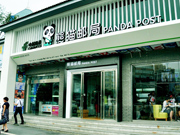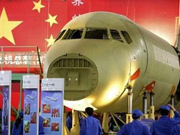 |
| Chinese Vice Premier Zhang Gaoli (3rd L, front) and Singapore Prime Minister Lee Hsien Loong (2nd L, front) attend the launching of the Singapore section during the 11th China-ASEAN Expo, also the 11th China-ASEAN Business and Investment Summit, in Nanning, capital of south China's Guangxi Zhuang Autonomous Region, Sept. 16, 2014. (Xinhua/Wang Ye) |
NANNING, Sept. 16 -- The coast of south China's Guangxi Zhuang Autonomous Region was once crammed with Chinese merchant ships ready to carry ceramics and silk to the Malay Peninsula, Myanmar and India.
National and business leaders from China and the Association of Southeast Asian Nations (ASEAN) gathered in regional capital Nanning on Tuesday to discuss how to reestablish this ancient maritime route.
The four-day expo has attracted over 2,300 companies from China and the ASEAN.
Addressing the opening ceremony, Chinese Vice Premier Zhang Gaoli called for China and ASEAN member countries to join hands to build a 21st Century Maritime Silk Road, referring to the initiative proposed by Chinese President Xi Jinping.
Zhang said this is a road for win-win cooperation based on common development and prosperity. It is also one of peace and friendship based on deeper mutual understanding, trust and stronger all-round exchanges, he said, promising that it will develop "new areas for economic growth."
The vice premier also proposed the two sides to strengthen the China-ASEAN Free Trade Area, enhance maritime cooperation and increase cultural and people-to-people exchanges.
BACKED BY LEADERS
China's proposals were welcomed by leaders from ASEAN countries along the route.
Singapore Prime Minister Lee Hsien Loong said he was looking forward to working closely with China to thrash out the details.
Singapore has benefited from Asian growth, especially trade with China. Trade between the two countries grew to 92 billion U.S. dollars in 2013, more than 20 times that of 1990.
Thai Deputy Prime Minister Tanasak Patimapragorn said he wants to see closer cooperation between the ASEAN and China as the country's trade, commerce and prosperity depend heavily on maritime connectivity.
As the world economic recovery dawdles, leaders are hoping that the Maritime Silk Road will facilitate economic integration and help Asian nations resist downward pressures.
Asia has remained a resilient growth engine and a significant part of this growth can be attributed to China's dynamism and regional integration, Lee said.
Lee expressed hope that momentum can be sustained despite regional frictions, not letting "disputes overshadow the positives of ASEAN-China cooperation."
POTENTIALS
China and the ASEAN countries have labelled the past 10 years the "Golden Decade" for their relations and have coined the term "Diamond Decade" for the next 10 years, which they hope will feature more practical cooperation and regional economic integration.
China is the ASEAN's largest trade partner, while the ASEAN ranks as China's third-largest. Their bilateral trade amounted to 443.61 billion U.S. dollars in 2013, around 5.7 times that of 2003.
The two sides are determined to push this figure to 500 billion U.S. dollars by 2015 and one trillion U.S. dollars by 2020.
Zhang Gaoli said that China will import more than 10 trillion U.S. dollars' worth of goods in the next five years and that its direct outbound investment will surpass 500 billion U.S. dollars.
"The sustained and sound growth of the Chinese economy will continue to drive the world economy and bring benefits to people of ASEAN countries," he said.

 PLA navy conducts live fire drill in East China Sea
PLA navy conducts live fire drill in East China Sea Top 10 Chinese actresses with pretty face
Top 10 Chinese actresses with pretty face Say cheese, kittens and puppies!
Say cheese, kittens and puppies! Top 10 Chinese goddesses selected by S. Korean media
Top 10 Chinese goddesses selected by S. Korean media The unique 'panda post office' in SW China
The unique 'panda post office' in SW China Going back to Three Kingdoms Period in Zhaohua ancient city
Going back to Three Kingdoms Period in Zhaohua ancient city Most amazing chi-pao beauties
Most amazing chi-pao beauties Xisha Islands welcomes first visitors
Xisha Islands welcomes first visitors Special thanks to special teachers
Special thanks to special teachers COMAC jumbo jet and its global rivals
COMAC jumbo jet and its global rivals
Day|Week|Month